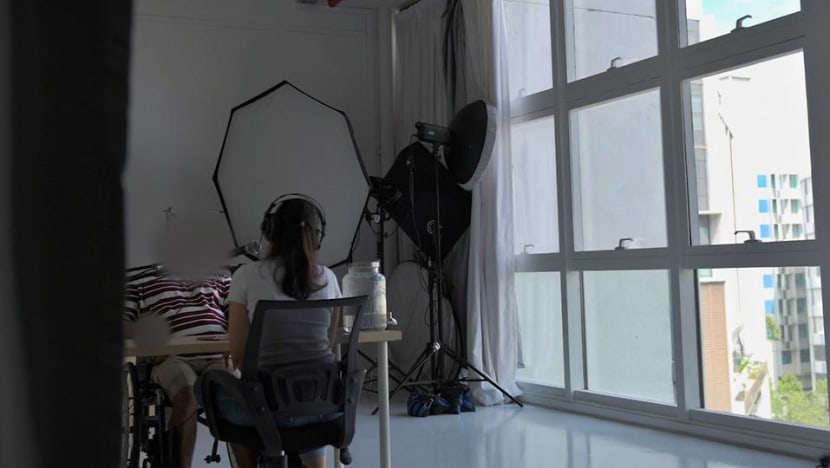I want a wife, not a maid: When a man with cerebral palsy looks for love, intimacy
Like many of his peers, Alex, 33, craves companionship and a family of his own in future. But his disability is not the only challenge. He must also overcome the attitudes of those around him and his past experiences.
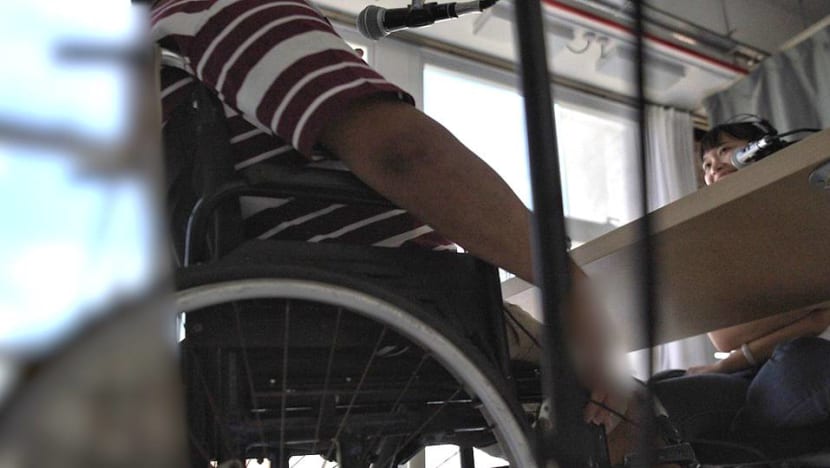
Can he consummate a marriage? Will any children he has “be like him”? These are questions Alex has faced. (Photo: Anne-Marie Lim)
SINGAPORE: Alex still remembers the first time a girl expressed feelings for him.
It was 2007, and he was 20. He was having dinner with a friend’s sister, Jane, when the teenager told him of her feelings. His immediate response was: “Are you crazy?”
He tells CNA Insider: “I was totally shocked that a perfectly able-bodied human being would come and tell me that she has feelings for me.”
It was a response conditioned by years of feeling inadequate and unable because he was born with cerebral palsy, a condition that affects muscle control and coordination.
He has always had trouble with even the simplest of tasks, like coordinating the movement of his eyeballs, getting dressed and using the toilet. Now aged 33, he uses a wheelchair or a rollator — a walking aid — to get around.
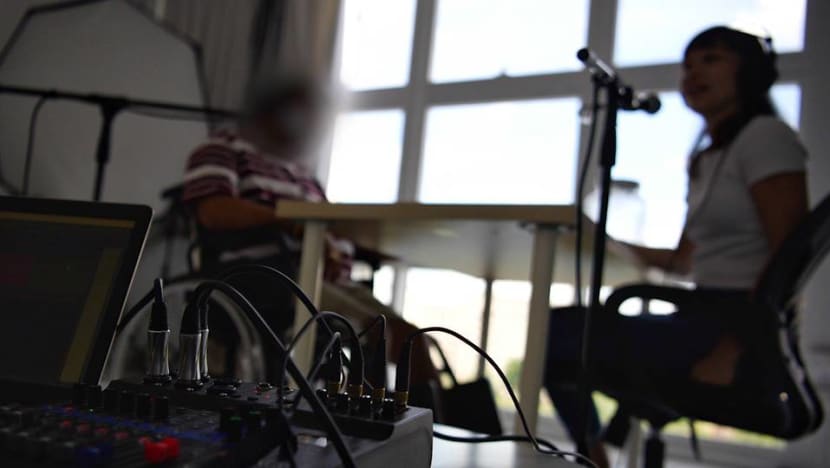
It took him three months to give Jane a chance. But his first real relationship was brought to a tragic end when she died in a car accident. They had been together for about three years.
To this day, Alex says he will never find someone who will understand him as much as she did.
But being in the relationship changed something in him: A decade after the loss of his first love, he acknowledges that he is no less deserving than his able-bodied counterparts in the search for companionship, marriage and, ultimately, a family.
His journey, however, is as challenging as it gets.
LISTEN: Looking for love, in a wheelchair — a podcast
‘A VERY DIFFERENT CHILDHOOD'
Alex, who requested that his name and those of his loved ones be changed owing to the personal nature of his story, had always known as he grew up that he was different.
At primary school, he relied on his parents and his domestic helper to carry him up to his classroom, where he sat with only his bag for company. No one in his class, he recalls, wanted to sit beside him.
While his classmates played during recess, he remained in the classroom, copying notes and trying to catch up on lessons. The trouble he had controlling his hands had made him slower than everybody else.
“It was a very different childhood, compared to a normal child of that age,” he says. “For me, the sole reason for going to school was to study and ... not to make friends or for fun.”
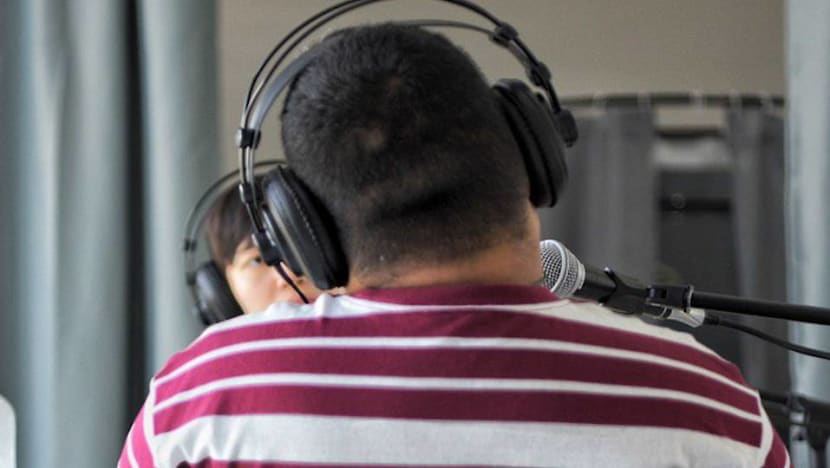
Things got better as the years went by, and he made friends along the way, some of whom were girls. But at secondary school, as he grew older and started having feelings for girls, he bottled them up.
“My conscious mind would tell me … ‘Better don’t go and tell them, because you have a disability,” he says. “Some of them were very close to me as friends, and I didn’t want to lose that friendship.”
No one, he recalls, ever said anything to him about not wanting to date him because of his disability. But this was the “preconceived notion” he had, a notion coupled with his experiences of being alone.
At home, he also had difficulties exploring his sexuality.
He was not allowed to lock his bedroom door or even the toilet door while he was showering or changing, and his parents would check on him periodically if they did not hear sounds coming from his room.
“My parents were naturally concerned because of my condition,” says Alex, who does not blame them as they were doing the best they could.
But he acknowledged the effect it had on the exploration of his sexuality as a teenager. He could only masturbate in the wee hours, for example, and he was always worried someone would open the door to check on him.
All these experiences, he says, shaped his attitude towards relationships and sexuality — which got shaken up when Jane made her way into his life.
THE TURNING POINT
Alex remembers agonising about whether he should give her a chance. With his disability and fear of rejection always at the back of his mind, he had never considered the idea of being in a relationship.
But Jane, he says, had known him for years, knew his character and his disability well and, despite his incredulous response, insisted that he should consider the possibility. She gave him three months to think about it.
He considered it carefully and, with the encouragement of his friends, agreed. “They told me … the least I could do is give her a chance. And I also thought, if I don’t try, I’ll never know,” he says.
Initially, however, he tended to “hold back quite a bit”. He was uncomfortable with touching her, finding it strange to hold her hand or hug her in public.
But she persevered. “She was always telling me that I didn’t have to be different just because I had a disability,” he says.
“It was a new school of thought for me … that I don’t have to be different from other guys in a relationship just because I’m in a wheelchair.”
WATCH: Dating, intimacy and my disability (14:11)
That was when he realised it was time to open up, emotionally and physically.
As Jane was living overseas, returning to Singapore only during semester breaks, the couple did not get much time together. They had to rely on the phone and online chats like Skype to communicate.
Slowly, however, Alex built up his comfort level with her and began to trust her more, and the couple became more intimate when they had the chance.
But Alex had flashbacks to an incident at his secondary school. A group of his classmates, tasked by his teacher to help him use the toilet, had taken his uniform while he was in one of the cubicles.
They also told him to call them if he ever needed to stand up to have sex, and they would come and hold him up.
“I was angry, and I told them that if I really had issues, I was sure my partner would have other ways to get things done,” he recounts.
Indeed, when he sensed that Jane was ready to explore that next step, they were able to work it out, proving once and for all that he was capable of having sex — using protection at all times, he adds carefully.
“I had a little bit of mixed thoughts … like, ‘What have I done, and did I do the right thing?’” he recalls. “But internally, I was also a little happy. Because it’s actually possible.”
He remembers the sinking feeling he had the day her brother called, informing him that she was involved in a car crash while driving overseas.
“It took me a very, very long time to get over her,” he says. “I still think about her a lot.
I don’t think I’ll be lucky enough to find someone who’ll be able to care for me and see the normalcy in me as much as she did.
FACED WITH QUESTIONS
He had been happy with Jane, but the relationship was not without its issues. For one thing, he had kept it from his parents.
At that point, with both youngsters studying and without serious jobs, he wanted to be sure they could “stand on their own feet” first.
“Knowing how conservative and traditional (my parents) were towards me and my disability, if I didn’t give them a complete, foolproof structure, they’d shoot it down,” he said.
While Jane’s family were aware of the relationship, her mother disapproved from the get-go.
“Whenever she got a chance to speak to my girlfriend, she’d ask to speak to me and ask me things like, ‘What are you trying to do? Are you trying to find yourself a lifetime maid?’” he recounts.
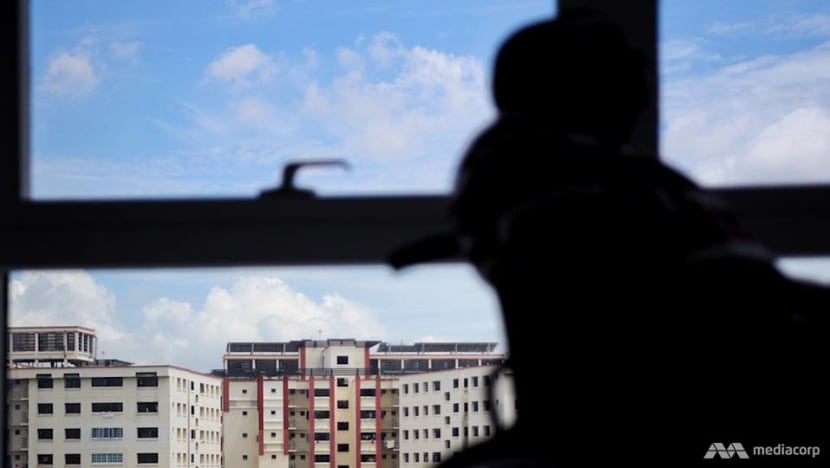
Another concern raised: How likely was it that any children they have would “be like you”? “Thankfully, we were pretty strong about it,” he says. “The good thing is, I also got the support of her father and her brother.”
Years later, Alex is grappling with some of the same questions in his search for love.
While he had not actively sought a relationship in the years after Jane’s death, by the time he was 27, friends and relatives tried to make arrangements for him to meet people, including posting his profile on overseas-based matrimonial sites.
But some of the prospects and their family members had questions for him from the first meeting.
“The majority of the questions were on my condition … how I managed my condition, how much support the person I’m meeting would need to provide. That was number one.” he said. “Number two, whether I could consummate a marriage.”
He describes himself as a confident person who no longer grapples with self-esteem issues. He has been doing advocacy work and has conducted workshops on topics like sexuality and disability awareness for more than a decade.
But there are times when self-doubt creeps in, for example the times he bites the bullet and approaches women he meets through his advocacy work.
At worst, they would say no, he thinks to himself. And “most of the time”, that is the case.
“It’s just like … ‘No, I don’t think we’ll match,’” he says. “They’re not like my first relationship … someone who says, okay, let’s give it a try and see how it goes.”
What about trying a dating app, like Tinder or Bumble? His answer is no.
“Rejections are part of life, but I think I’ve heard rejections too many times for too many things, and I just don’t want to hear it for this kind of thing,” he says.
“Even if I go in there, would this person actually understand (me)?”
He has considered dating others with disabilities, but he also stresses the importance of complementing each other.
“I need a certain degree of assistance in activities of daily living,” he points out. “If my partner has a similar disability (and) needs that same amount of assistance, how are we going to help her while I’m on a wheelchair myself?
“You must be able to help each other out with your different disabilities.”
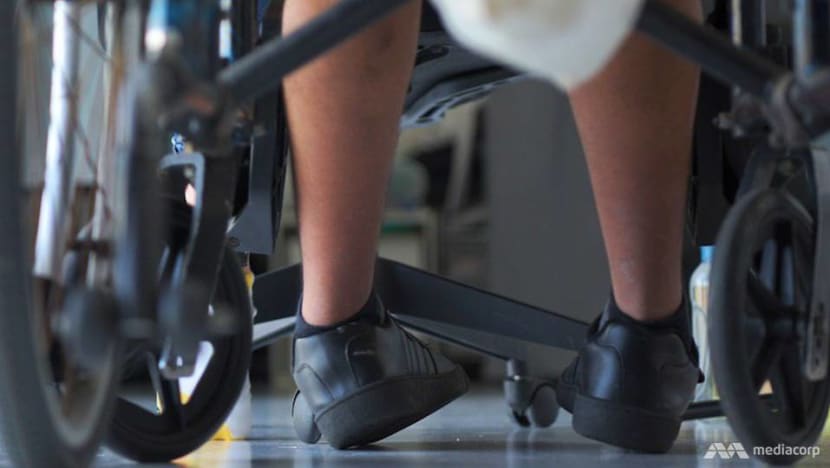
BREAKING THE CHAINS OF LOVE
Many people with disabilities, however, believe they cannot have a relationship simply because of their disability — something Alex has realised through his advocacy work.
“I want to break that,” he says. This is why he is telling his story to CNA Insider.
Ariel, a close friend of Alex who also has cerebral palsy, believes that such thinking is “very common in Singapore”, whether among able-bodied people or those with disabilities.
“When I was younger, older relatives always told me that maybe I should find someone like myself, who’s disabled, because (he) would understand me best,” she says.
“But my dream has always been to be with a non-disabled person — not because I want to show off, but because I know the extent of my disability, and I know that I need someone to take care of me.”
Ariel, who is in her 30s, thinks it is “very much” a matter of self-perception.
“If you want to put your disability at the forefront, then of course things would be difficult,” she says. “But if you choose to … (be) more than your disability, then it shouldn’t be a problem.”
Alex acknowledges that his future wife would have to take on caregiving duties. But he is adamant that he is looking for far more than a carer.
“I have to respect you, and I have to give you that level of commitment and confidence that you’re my wife and not a maid who’s working for me,” he said. “That’s a different level.”
NOW IS THE TIME
He also acknowledges that he now “needs to start thinking of a serious relationship and settling down”.
“Being single is fantastic,” he says. “But the more serious thing is companionship, and I want to start my own family. I love kids.”
Thinking about friends his age who are married with children, he adds: “Maybe my life would be different if I didn’t have a disability.”
READ: ‘Why take on the extra burden?’: Parents with disabilities tackle misconceptions about raising their own families
As his parents age, he says, they are also starting to worry about how he would be able to live alone. He himself is frank in this matter: How long can he depend on a domestic helper to help with his activities of daily living?
“It’s not practical because as I age, my ability to do what I’m doing now will become even weaker,” he says. “There are certain points where only a spouse can come in to assist.”
Over the years, he has worked at building up his independence. Through therapy, which began when he was three months old, he can now handle tasks such as showering himself or bending down to pick up things.
“I need to make myself physically able to maintain all that I’ve achieved from childhood until now, for as long as I can,” says Alex, who works in the IT industry.
Recently, he has been looking to make it easier to dress himself by, for example, engaging Elisa Lim, the founder of Will and Well, a fashion label that creates clothes for people with disabilities and special needs.
READ: This 25-year-old makes clothes for the disabled. She’s still finding acceptance in the design industry
Lim says: “He wanted (me) to make clothes that are ... easy for him to put on, so that when he finds a partner, he can take care of himself and not have to burden her.”
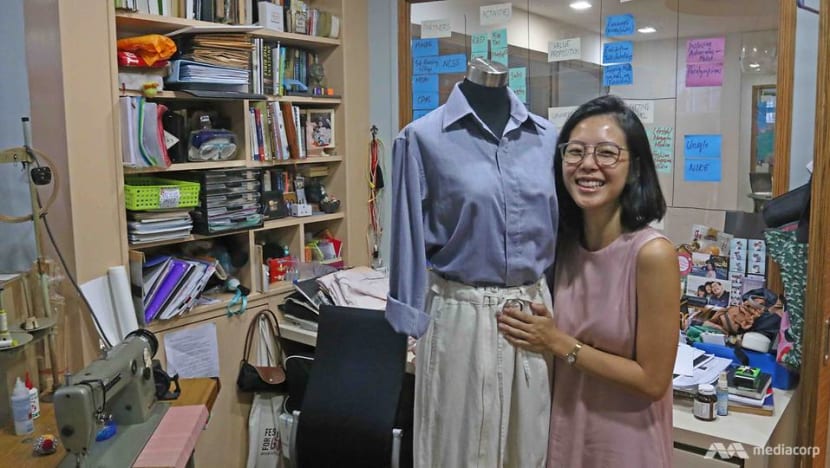
Alex's coordination and reflexes are weak, so he may take a long time to complete fiddly tasks like doing up buttons. Lim therefore worked on a shirt with magnetic buttons to help him.
She is now working on a pair of dressy trousers with an adjustable waistband, which will be easier for him to remove, particularly when he uses the toilet.
The two have developed a friendship that has blossomed since they began working together at the start of the year, and Lim is excited that he is thinking of a life partner.
“He’s a very determined person, so I believe if he wants something, he can achieve it,” she says.
‘WE’RE THINKING ABOUT MARRIAGE’
There is hope for Alex indeed. Some time ago, he met a woman overseas through his volunteer work. The pair chat regularly, and he is hopeful the relationship will progress further.
They had wanted to arrange for him to visit her parents, to let them know “that we’re serious and that we’re thinking about marriage … in future”, he shares.
COVID-19 has put these plans on hold. And he recognises that more challenges lie ahead for them. For example, as with his first relationship, his parents are still in the dark
“Though they want me to try and get married, they aren’t quite convinced that I won’t be a liability to my partner,” he says. “Their concern is that the caregiving role will supersede the spousal role.”
Resistance might also come from the woman’s parents. “Certain parents can be a little dominating,” he says. This might arise, he feels, from the fact that she has a disability too: She is hearing-impaired in one ear.
“If things are really going to go well, I’m someone who may not have an issue with trying to take things forward despite resistance,” he added. “But whether she’d have the guts to do that or not is another thing.”
He worries about what the future will bring. But he is determined to overcome the challenges, whether it is his parents’ overprotectiveness or the attitude of others.
“I’ve come to a stage where I’ve realised that whatever I do, the nagging, negativity and comparison is always going to be (there),” he said. “I’m just going to do what I’m going to do.”
